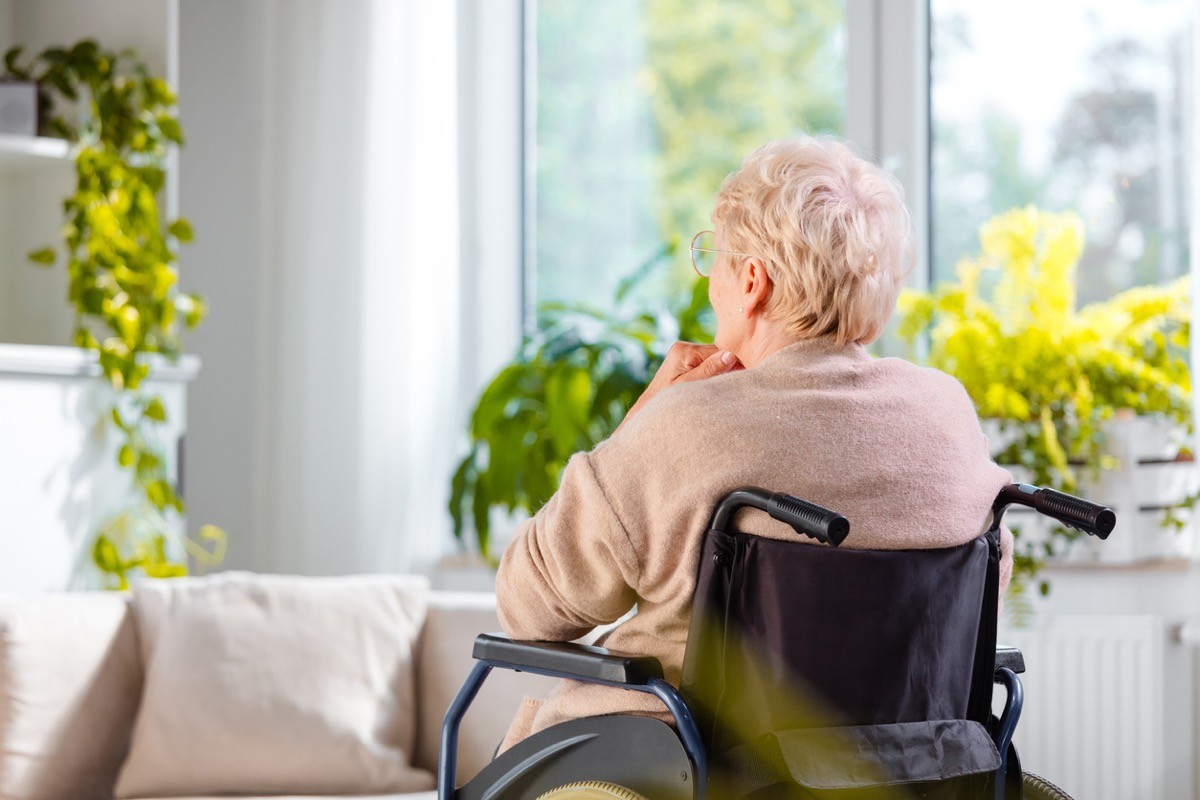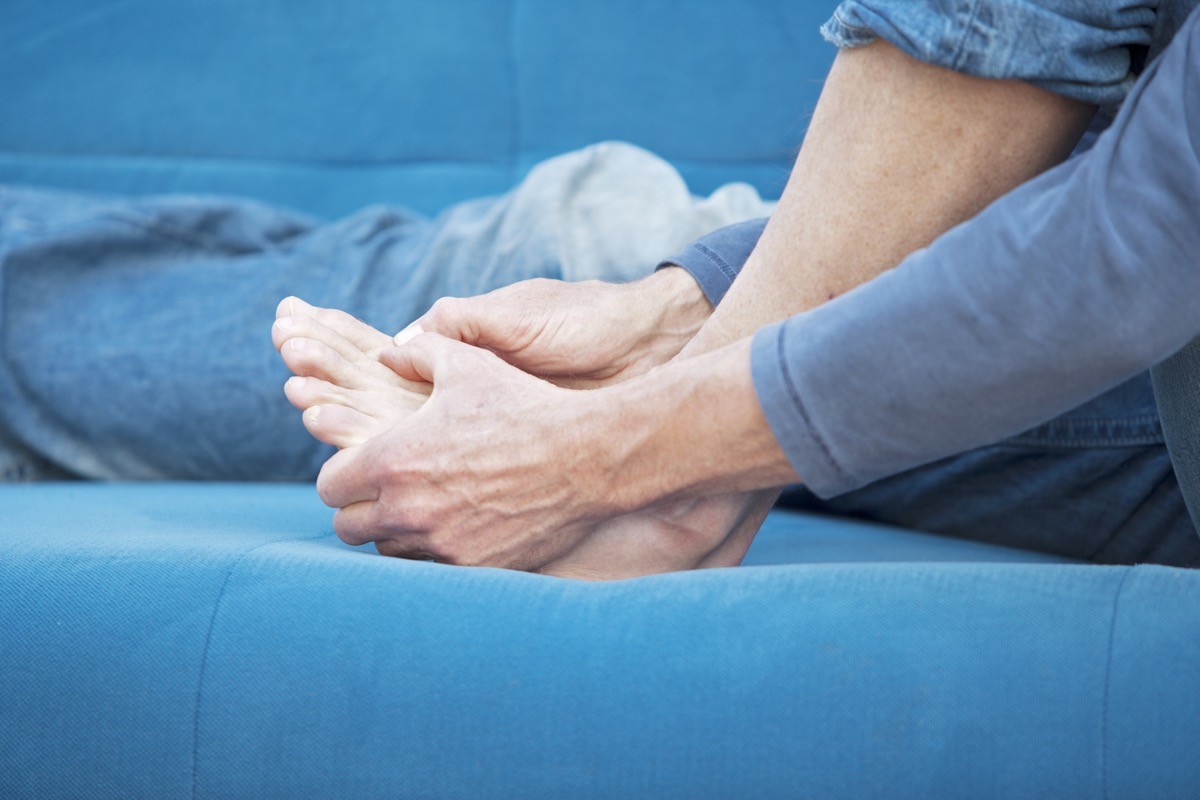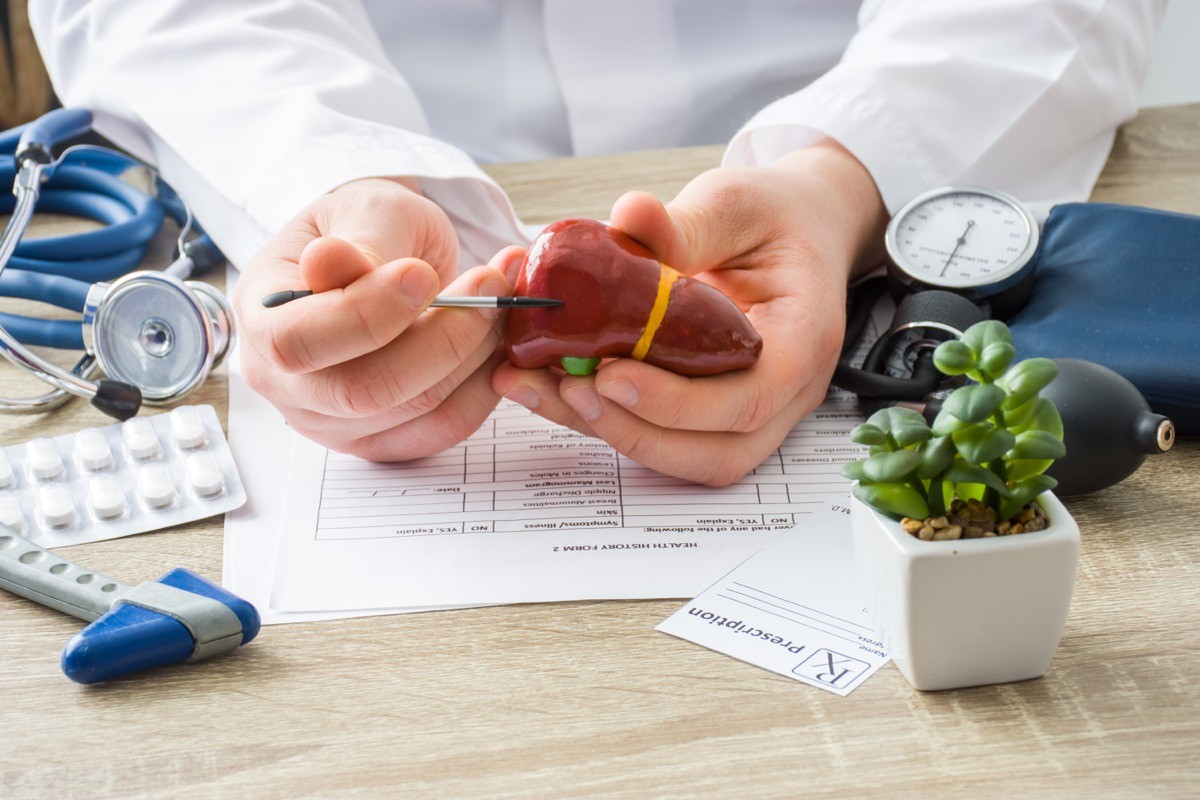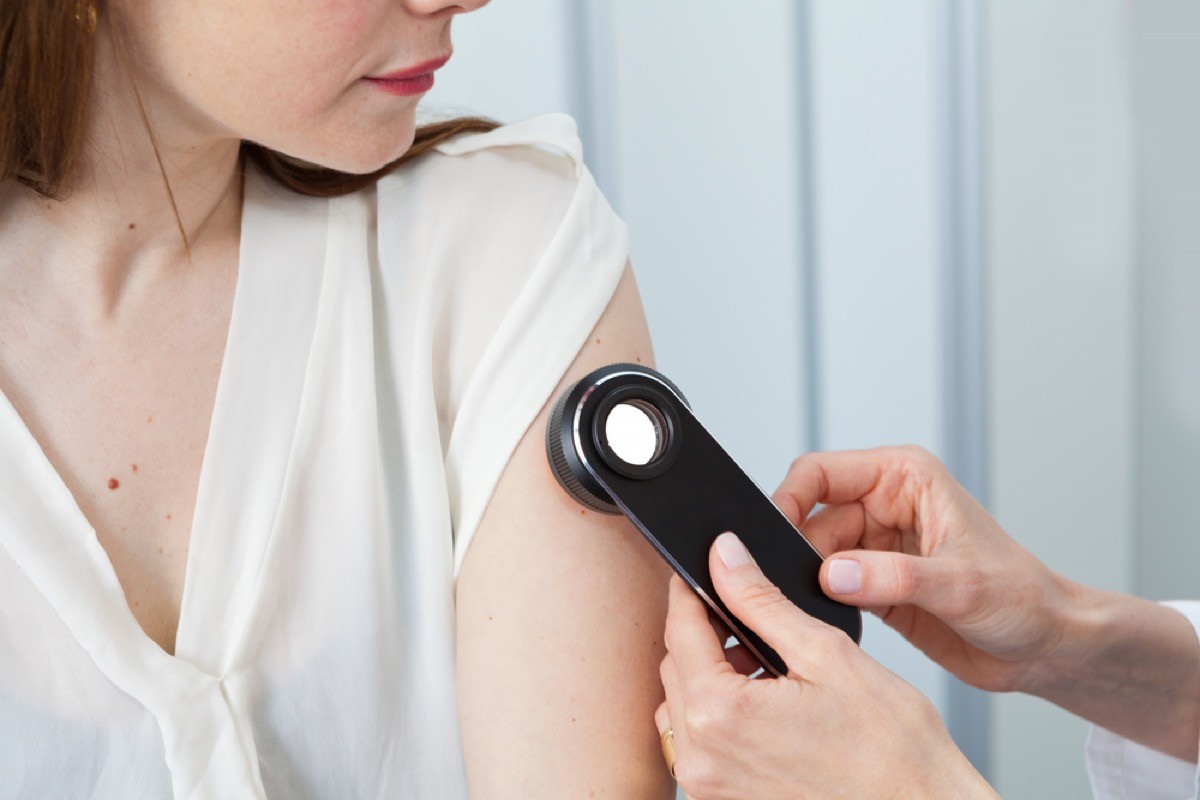22 Health Benefits Coming From Your Cup of Coffee

If you can’t start your day without a cup of coffee, you’re most certainly not alone. According to a recent survey, nearly three in four Americans drink coffee daily, and 36 percent drink three to five cups of coffee a day. Moreover, nearly half of the respondents believe that coffee benefits their health—and, as it turns out, they’re correct. A new study published in the Endocrine Society’s Journal of Clinical Endocrinology & Metabolism (JCEM) found that consuming a moderate amount of caffeine each day (about three cups of coffee) lowered one’s risk of heart disease, stroke, diabetes, and high blood pressure. But it doesn’t end there: Read on for 22 physical and mental health benefits coming from your cup of coffee.
RELATED: Longevity Expert Says Avoid Eating the “Poisonous 5 Ps” If You Want to Live to 100.
1
Coffee may help prevent Parkinson’s.

According to a recent study published in The Lancet Regional Health—Western Pacific, certain populations showed a decreased risk of Parkinson’s if they regularly consumed coffee or tea.
This particular study showed the benefits for Asian individuals with certain Asian-specific gene variants, however, other studies point to broader health benefits related to caffeine and Parkinson’s.
For example, a 2007 study published in Movement Disorders found that those who drank coffee every day had a lower risk of developing the disease than non-drinkers.
And a 2023 study published in Environmental Research concluded that caffeic acid, which is present in coffee grounds, has “anti-inflammatory and antioxidant properties [that] may help combat the effects of lifestyle and environmental factors that increase the risk of” Parkinson’s, reported Medical News Today.
2
It can reduce your risk of Alzheimer’s.

Unfortunately, there’s no cure for Alzheimer’s, the disorder that slowly causes memory loss and mental decline. But coffee could help reduce the risk of developing it.
A 2006 review published in Neurology Research found that drinking high levels of coffee was associated with up to a 30 percent reduction in Alzheimer’s risk. And the aforementioned Environmental Research cited coffee grounds as protective against both Parkinson’s and Alzheimer’s.
3
It can help protect against dementia.

Similarly, in a 2017 study published in the journal Scientific Reports, researchers found 24 compounds that could possibly boost a brain enzyme that protects against dementia—and caffeine is one of them.
Additionally, a 2023 study published in the journal Nutrition Reviews found that those who regularly drink coffee and tea are “27 percent and 32 percent less likely, respectively, to develop cognitive disorders compared to those who don’t.”
4
It can sharpen your memory.

One of the best benefits of coffee? Its ability to give your memory a boost.
In a small study from the Radiological Society of North America, researchers found that two cups of coffee was able to boost participants’ short-term memory skills because of caffeine’s effect on higher brain function.
“Coffee is a beverage that contains caffeine and antioxidants, both of which have been proven to possess neuroprotective properties,” Krutika Nanavati, RDN, a registered dietitian and nutritionist and a medical advisor at Clinicspots, previously explained to Best Life. “Coffee consumption has been linked to enhanced cognitive abilities, including memory, attention, and processing skills. It stimulates the central nervous system, promotes alertness, and reduces the perception of fatigue.”
5
Coffee can sharpen your reaction time and coordination.

Feeling a little slow lately? All it might take to get your body back to working at a normal pace is a little coffee.
A 2005 study from the Radiological Society of North America found that a couple cups of coffee can improve your reaction time. Likewise, a 2010 review in the journal Nutrition found that caffeine can actually enhance neuromuscular coordination, making your brain send messages to your muscles faster.
RELATED: Tomatoes Are the Healthiest Fruit in the World, CDC Says—Here’s Why.
6
It may help ease depression.

If drinking a cup or two of coffee tends to make you feel good mentally, there’s a reason for that: A 2014 study published in the World Journal of Biological Psychiatry found that coffee actually acts as a mild antidepressant by boosting feel-good neurotransmitters in the brain.
Likewise, a 10-year-long 2011 study published in JAMA found that coffee can have a serious mood-boosting effect in people with depression.
7
It can help prevent heart disease.

Heart disease—a disorder of the blood vessels that leads to heart attacks—causes more than 700,000 deaths in the U.S. every year. Luckily, coffee could help keep your heart healthy.
The recent JCEM study looked at Cardiometabolic multimorbidity (CM), or the presence of at least 2 of the following conditions: type 2 diabetes, coronary heart disease, and stroke. Compared to the study participants who had no caffeine or very little caffeine, those who had roughly three cups of coffee a day, “had the lowest risk for new-onset CM,” the researchers wrote.
“Multistate models revealed that moderate coffee or caffeine intake was inversely associated with risks of almost all developmental stages of CM, including transitions from a disease-free state to single cardiometabolic diseases and subsequently to CM,” they continued.
Previous research has also found that coffee consumption was associated with a reduced risk of developing a heart arthymia.
8
It could lessen your stroke risk.

Strokes are scary business, and drinking coffee could help reduce your risk of having one.
In addition to the JCEM study, a 2017 study published in the Annals of Internal Medicine, researchers found those who love their daily brew had a reduced risk of death from many causes, strokes included.
9
It may reduce your risk of diabetes.

A 2005 review published in JAMA suggests that those who enjoy drinking coffee every morning have a much lower risk of developing Type 2 diabetes. So pour yourself a cup—just make sure you nix the cream and sugar.
10
It can reduce your risk of multiple sclerosis.

A 2016 study published in the Journal of Neurology, Neurosurgery, and Psychiatry found that drinking a high consumption can help reduce your risk of multiple sclerosis, a disease that causes the immune system to attack the protective covering of the nerves in the brain, spine, and eyes.
And not just by a little, either: Researchers found that drinking more than four cups of coffee could reduce your risk by 31 percent.
11
It can help ease a headache.

According to the National Headache Foundation, caffeine contains properties that narrow the blood vessels and restrict blood flow, which in turn helps relieve the throbbing pain you experience with a headache.
In fact, when you add an actual pain reliever into the mix, you can increase the pain-relieving effect by 40 percent.
RELATED: 21 Surprising Signs You Have a Vitamin Deficiency.
12
Coffee can help you lose weight.

Caffeine is a natural stimulant that increases metabolism, which can help you burn calories and lose weight.
A 2021 study published in the Journal of the International Society of Sports Nutrition found that people who consumed “the equivalent of one cup of strong coffee before endurance exercise” burned more fat during their workout, as Best Life previously reported.
13
It may help reduce your risk of digestive disorders.

In the aforementioned 2017 study of more than 521,000 people and 10 countries published in Annals of Internal Medicine, researchers found those who drink coffee had a decreased risk of dying from digestive diseases, which includes everything from Crohn’s to celiac.
14
Coffee can provide vital nutrients.

According to the U.S. Department of Agriculture (USDA), a cup of coffee provides 49 mg of potassium (vitamin K), 3 mg each of magnesium and phosphorus, and 2 mg each of calcium and sodium.
Adding milk will provide additional vitamin C, vitamin D, and protein.
15
It can reduce your risk of gout.

If you don’t know what gout is, hopefully, you never have to find out firsthand: It’s the type of painful arthritis that comes about when there’s excess uric acid in the bloodstream. The good news? A 2007 study published in Arthritis and Rheumatology found long-term coffee consumption could help decrease your risk of gout because of its ability to lower uric acid levels.
16
It may keep your liver healthy.

In a 2016 review published in Alimentary Pharmacology and Therapeutics, researchers found that people who drank two cups of coffee a day had a 44 percent lower chance of developing liver cirrhosis.
Hepatocellular cancer—which predominantly occurs in those who have chronic liver disease—is the most common form of liver cancer, and coffee can help reduce your risk of developing it.
Additionally, a 2017 study published in BMJ Open found it could be possible to see a 20 percent reduced risk of hepatocellular cancer (which predominantly occurs in those who have chronic liver disease) by drinking one cup of coffee a day, or a 35 percent risk reduction by drinking two cups.
RELATED: 12 Supplements You Should Never Take Together, Medical Experts Say.
17
It could lower certain cancer risks.

According to the American Cancer Society, there is much conflicting research on whether or not coffee can reduce cancer risk. However, some studies do show positive associations.
“Recent studies find that coffee may lower the risk of several types of cancer, including head and neck, colorectal, breast, and liver cancer, although the potential beneficial effects of coffee are not completely understood,” their experts wrote.
“Hundreds of biologically active compounds including caffeine, flavonoids, lignans, and other polyphenols are found in roasted coffee. These and other coffee compounds have been shown to increase energy expenditure, inhibit cellular damage, regulate genes involved in DNA repair, have anti-inflammatory properties and/or inhibit metastasis, among other activities,” they explain. “There is also evidence that coffee consumption is associated with lower risk of insulin resistance and type 2 diabetes, which have been linked to higher risks of colorectal, liver, breast and endometrial cancer incidence and/or mortality.”
18
It could lessen your skin cancer risk.

Of course, coffee is no substitute for sunscreen when it comes to protecting your skin, but it still has some benefits.
A 2014 study published by the American Association for Cancer Research found drinking coffee can help reduce the risk of melanoma, which, according to the American Cancer Society, causes the majority of skin cancer-related deaths.
Coffee may also reduce the risk of basal cell carcinoma, which affects millions of people every year.
A 2012 study of 113,000 participants published by the American Association for Cancer Research found that those who drank a minimum of three cups of coffee a day had a 20 percent lower risk of developing basal cell carcinoma than those who didn’t.
19
It can help prevent cavities and gum disease.

Brushing isn’t the only way to prevent cavities. While coffee is known to stain the teeth, it’s also been found to protect them.
A 2009 study published in the Journal of Conservative Dentistry found drinking coffee can help prevent cavities and tooth decay, but there’s a catch—you have to drink it black. Unfortunately, coffee with sugar doesn’t have many benefits for your teeth—or your overall health.
Plus, a 2014 study in the Journal of Periodontology found that regular coffee consumption can benefit your gums too, helping prevent the serious infection periodontitis—AKA gum disease—which can result in tooth loss and other health issues.
20
Coffee could actually make your naps better.

Sounds counterintuitive, but drinking coffee can actually make your naps more effective. As Best Life previously reported:
When you drink coffee before falling asleep, the caffeine prevents your brain from absorbing adenosine, a naturally occurring neurotransmitter in your body that causes sleepiness, according to a Jan. 2015 study published in Current Neuropharmacology. In turn, a short nap can enhance caffeine’s energizing effects by increasing caffeine receptor availability in your brain, according to Healthline experts.
21
It can help with erectile dysfunction.

Anyone who has had had problems in the bedroom can benefit from starting their day with coffee: A 2015 study published in the journal PLOS One found men who drank two to three cups a day are less likely to have erectile dysfunction.
22
It may help you live longer.

Drinking coffee alone won’t necessarily make you live longer, but researchers in a 2017 study published in Annals of Internal Medicine did find those who drink coffee appear to live longer than those who don’t. In fact, one cup a day was associated with a 12 percent decreased risk of death while two or three cups reduced a person’s mortality risk by 18 percent.
But remember to speak with your doctor.

Of course, when anything pertains to your health, it’s always advisable to speak with your doctor about any potential benefits, downsides, or side effects. Drinking coffee is no exception, especially if you’re thinking about increasing your caffeine intake.
In speaking with CNN about the recent JEMA study results, Gregory Marcus, MD, associate chief of cardiology for research and professor of medicine at the University of California, San Francisco said, “Even if caffeine, coffee, and tea in the amounts described in this study … are indeed healthy, there is also strong evidence that high-dose caffeine, particularly when included in artificial concoctions like energy drinks, may actually cause harmful and even dangerous heart rhythm problems.”
- Source: https://pubmed.ncbi.nlm.nih.gov/17427282/
- Source: https://www.nature.com/articles/srep43846
- Source: https://www.sciencedaily.com/releases/2005/12/051212091544.htm
- Source: https://jamanetwork.com/journals/jama/article-abstract/201177
- Source: https://jnnp.bmj.com/content/87/5/454
- Source: https://onlinelibrary.wiley.com/doi/full/10.1002/art.22712
- Source: https://onlinelibrary.wiley.com/doi/full/10.1111/apt.13523
- Source: https://cancerres.aacrjournals.org/content/74/19_Supplement/LB-280
- Source: https://www.ncbi.nlm.nih.gov/pmc/articles/PMC2848806/
- Source: https://journals.plos.org/plosone/article?id=10.1371/journal.pone.0123547
- Source: https://www.acpjournals.org/doi/10.7326/M16-2945